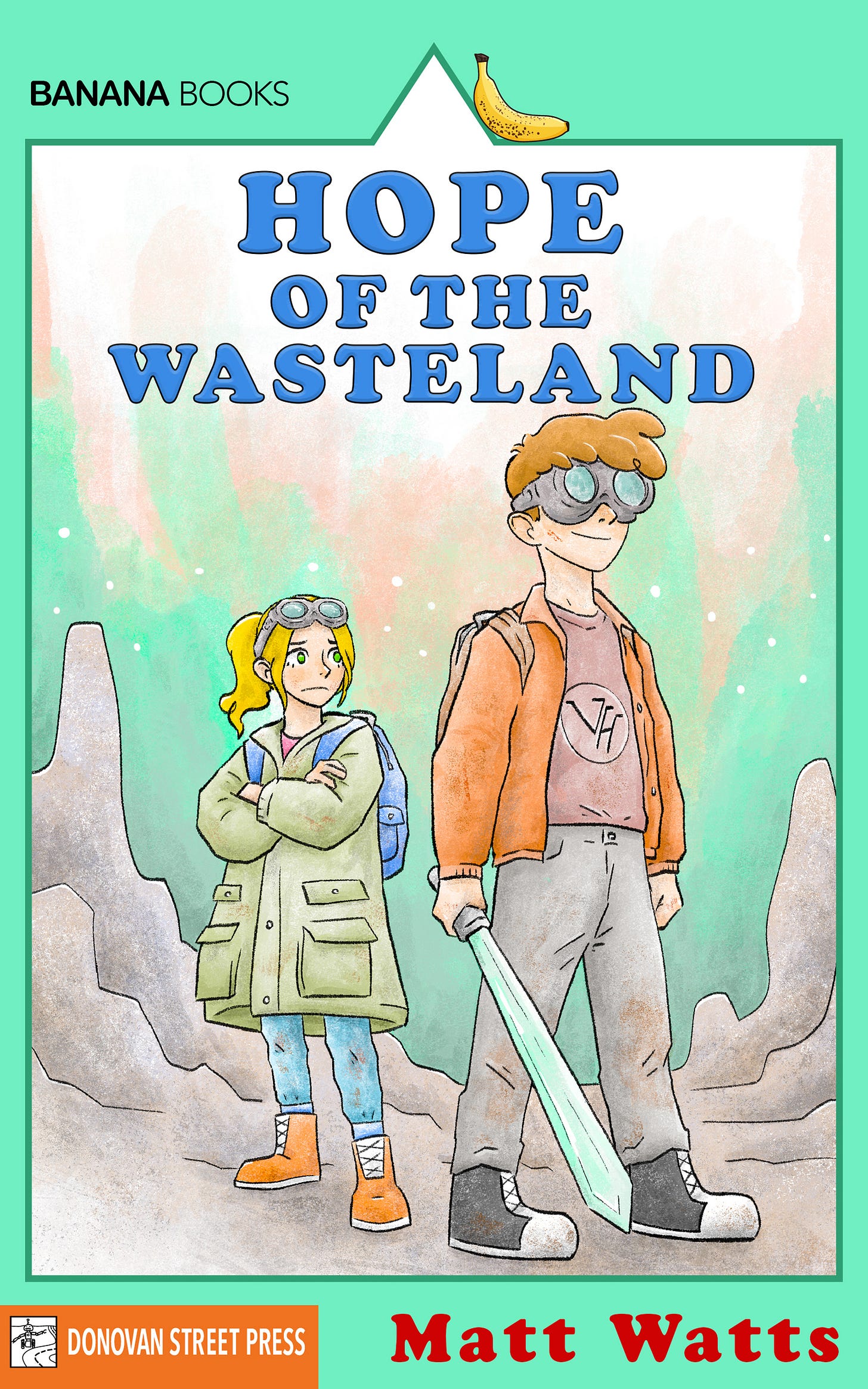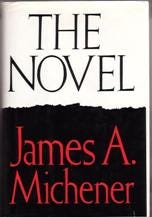A Long Ramp Up to Profitability, James A. Michener's The Novel, and More...
“I love writing. I love the swirl and swing of words as they tangle with human emotions.” —James Michener
Being the 50th edition of Assorted Nonsense, the official newsletter of Donovan Street Press Inc.
I’m trying to finish my novel Captain’s Away! (yes, the one I’ve been serializing) so I’ve placed several other activities on the backburner, including this newsletter. Prioritizing is difficult! In fact, if I were capable of successfully prioritizing, I wouldn’t be writing this newsletter, because it’s not supposed to be the priority. Finishing my novel is. But as Homer Simpson once said, what are ya gonna do.
So, in no particular order, here’s a grab bag of stuff that has been on my mind lately.
Believe Half of What You Believe
There is a quote, attributed to Edgar Allan Poe, which goes:
“Believe nothing you hear, and only one half that you see.”
~The System of Dr. Tarr and Prof. Fether
Though apparently William Johnson Neale wrote something like it first, in 1831:
“The rule with us is, believe nothing you hear, and but half you see.”
~Cavendish: Or The Patrician at Sea
You can read more about the possible origin of the phrase here.
I just bring it up because I’d like to suggest a revision. How about:
“Believe half of what you believe.”
Yes, we should have the strength of our convictions. But I do not believe now, at the age of 59, all that I believed at the age of 39, or 29, or 19. Or even all that I believed one month ago. My beliefs have evolved. They’ve evolved with new information, as the result of new experiences. After having spoken to different people, read new books, or after thinking more deeply about this or that. What a dull, insufferable person I would be if I made up my mind about everything at twenty-two years of age and then never changed my mind. Why, I still wouldn’t like squash or turnip, perfectly fine vegetables that I was wrong to be prejudiced against.
Or, more seriously, I would still be homophobic. Which, I am deeply ashamed to say, I was as a teenager growing up in a small town without knowing any better. But I can’t turn back the clock; I can only resolve to evolve further, to “seek perfection of character,” as we say every week in my dojo.
Donovan Street Press Inc. Stuff
I think it’s gradually dawning on some people that I’m serious about this little publishing company that I’m running with the help of my friend Jenn DeLagran. It’s still far from clear whether it’s a good idea: I remember with absolute clarity Robert J. Sawyer telling me the following joke one day over coffee back in 2016:
Rob: How do you make a million dollars publishing?
Joe: I dunno, Rob. How?
Rob: Start with ten million.
I’ve told that joke before. And I’ll keep repeating it until it’s no longer true for me.
The thing is, it’s a long ramp up to profitability. I began publishing under the name Donovan Street Press in December 2019 with the publication of my short story collection Other Times and Places, followed by A Time and a Place in Jan 2021, and then The Deer Yard and Other Stories, a collection of short stories by my father in Dec 2021. It wasn’t a company then, just a name to self-publish under.
When I decided to publish Adventures in the Radio Trade, a memoir about working for CBC Radio, in August 2023, it seemed prudent to incorporate Donovan Street Press in case someone took exception to the book (there isn’t anything the least bit litigious about it, but you never know). Once I had an actual company and experience (albeit limited) publishing books, it just seemed to make sense to start publishing books of friends, and then books from friends of friends, and then books from people I’ve long admired, and who knows whose books next.
But although we’ve got a bunch of books coming out soon, right now we’re operating solely on profits generated from the first five books we’ve published: three from me, one from my father, and one from Tanah Haney (who has the distinction of being the first non-Mahoney published by Donovan Street Press). Well, profits from those books along with money I’ve invested personally into the company. Which isn’t much more than I might have paid for some other hobby, such as ice hockey, maybe, but isn’t inconsequential.
I should have anticipated it, but it kind of astounds me how the costs add up, reinforcing just how difficult it is to make a go of it writing and publishing these days. Which is why, when you visit a typical Canadian publisher’s website, you will often see this sort of thing:
“We acknowledge the generous support of the Government of Canada, the Canada Council for the Arts, and the Government of New Brunswick.”
Because they really can’t make a go of it otherwise. Some would say, well, if they can’t survive without government support then they shouldn’t be in business. I disagree with that sentiment vehemently because I believe that a world without such support would be an anemic world indeed. Art and artists have required some form of patronage from time immemorial.
At Donovan Street Press, however, you will see:
We gratefully acknowledge the generous financial support of those who purchase our books.
This is because we haven’t gotten around to applying for public assistance (too many other things to do and too few of us) and because I am curious to see how long we can hold out without applying for such funding. One of the problems with how the current funding model works is that there are conditions applied, such as having to have been in business for X amount of time, publishing a certain amount of authors from such and such a place, having a certain number of employees, and so on. I’m not saying that I’m opposed to that criteria, but I would prefer to avoid limitations at this point in our development. Also, I wouldn’t want to become dependent on such funding only to have the rug pulled out from under us at some critical juncture.
Fortunately, we do have a couple of new books launching shortly. Mark A. Rayner’s The Gates of Polished Horn launches March 1st, and Matt Watts’ Hope of the Wasteland comes out March 25th. I’m certain that once these books hit the shelves all our financial worries will go away.
That’s a joke; I’m not nearly so naive. I am confident that these titles will do well (they are excellent books), but challenges remain.
There is the question of Amazon, for example.
Maybe you didn’t notice, but with the exception of one book, all the links I’ve provided so far in this newsletter have been to Canadian retailers. Here in Canada we are trying to buy Canadian in response to the threat of tariffs from the U.S. To be clear, this is a response to the current U.S. administration and its hostile economic policies as opposed to any ill-will toward Americans in general. (I am completely opposed to booing the Star-Spangled Banner at sporting events, for example, which I consider inappropriate and rude.)
Since Christmas, sales of Donovan Street Press books on Amazon have dwindled to a trickle. This could be because nobody wants those books anymore; as I mentioned, the current backlist consists mostly of books that have already been out a while. Or it could be because the Canadians who might otherwise be buying those books are no longer shopping on Amazon. This is a problem because most of the books we’ve sold in the past have been via Amazon. That’s where most people have been buying their books these days.
I have no problem selling our books elsewhere, especially after the stunt Bezos pulled with the Washington Post, as long as our books actually sell elsewhere. Otherwise Donovan Street Press Inc. will be out of business shortly after having gone into business. Clearly we will have to do a better job of making potential buyers aware of where to purchase our books elsewhere in Canada.
Hope of the Wasteland
Thilled to report that Matt Watts’ debut novel Hope of the Wasteland, about a 12-year-old boy braving “a treacherous post-apocalyptic world to track down his missing father” received a terrific review from Kirkus:
This absorbing and electrifying dystopian tale will appeal to all ages. ~ Kirkus Reviews
Hope of the Wasteland is available for pre-sale at Amazon… but you can bet we will make it available from Canadian vendors (and abroad) starting March 25th.
James Michener’s The Novel
As a teenager and into my twenties I loved James Michener novels. My father got me into them. He never, ever understood my love of science fiction, thought I would eventually grow out of it (hasn’t happened yet, and I’m closing in on 60), but we could definitely bond over James Michener.
By the time I was thirty I’d read most of his books. Hawaii, Chesapeake, Texas, Space, Centennial, Rascals in Paradise, Drifters, The Novel, The Source, Tales of the South Pacific, and that’s just off the top of my head (there’s plenty more). Of those, my favourites were The Drifters, and The Source, but I thoroughly enjoyed the others as well (though didn’t quite make my way through Poland).
I read Michener’s The Novel about thirty years ago but didn’t remember much of it and picked it up again a couple of months ago. Having started my own publishing company, I was curious to see what he had to say about writing and publishing. He published it in 1991, when he was 84 years old. I thought maybe that because he’d written it at such an advanced age that it wouldn’t be up to his usual fare, but this was ageist of me; although not his best, it’s still pretty good, and held my interest throughout. He tackles publishing from the perspective of four separate characters involved (mostly) with the publication of a single book: the writer (writing the final book of his career), the editor (of that book), a book critic (who really doesn’t like the writer), and a reader (friend and fan of the writer. Having over forty books under Michener’s belt by the time he tackled the subject of publishing doesn’t hurt; he’s in pretty familiar territory here.
There’s one bit in the book that I quite appreciated. Check out this passage, which, it seems to me, presaged what is happening in the United States today. Remember, this was written in 1991. Michener prided himself on his ability to extrapolate from current geopolitical contexts. I think he was a fearful of certain strains of conservatism that he saw germinating back in his day. He would not be surprised at the rise of conservatism we're seeing around us today:
But that’s not the best of it. One page later Michener writes:
“Worst of all is the form in which an author interjects from time to time his own sly comments. How objectionable it is when it first breaks the flow of the narrative, how repulsive at the end of a long tale when the convention actually creaks like a poorly loaded hay wain. Never do it yourself, never allow a student to do it, and when you review books, castigate it.”
Michener knew his limitations as a writer; he did not consider himself the least bit funny. But this is pretty funny. Dry as a bone funny, but funny — if, in fact, it was deliberate, and I have no way of being sure of that. If I’m correct, this is Michener poking fun at himself through his character Devlan, because in this very passage, and in the passage about Sparta one page earlier, he’s doing exactly what he’s counselling against: introducing his own sly comments. I mean, the bit about Sparta has nothing to do with publishing. Why else include it in a book about publishing? And maybe I’m over thinking it, but I don’t think so, because Michener was damned smart: I think he’s using the whole bit to slyly counsel against taking critics too seriously. Take what they say with a grain of salt. Their opinions are just that: opinions. Well-informed, maybe, but still just opinions.
I didn’t really learn much about publishing from The Novel, though. Michener is tackling publishing here from the perspective of the late 80s. His idea of avant-garde publishing involves using different fonts; I’m guessing Michener never read any Alfred Bester. Indie publishing wasn’t a thing. Reading The Novel did induce me to read George Eliot’s Middlemarch, which Michener obviously admired, and was described by the novelist Virginia Woolf as "one of the few English novels written for grown-up people" and by Martin Amis and Julian Barnes as the greatest novel in the English language (I stole those quotes directly from Google; hey, it’s not like Google never stole anything). I’m a quarter of the way through Middlemarch. I am enjoying it, and even learning from it, but clearly Martin Amis and Julian Barnes needed to read more books.
Anyway, I don’t recommend The Novel (or even Middlemarch) for just everyone. Read The Novel if you like Michener’s books and haven’t gotten to that one yet (it is a pretty deep cut in his catalog) and/or read both if you happen to have a deep interest in writing and publishing. Otherwise skip ahead to the next item in today’s newsletter.
DSP Inc. Featured Title
A Peculiar Symmetry
Aiden and Minnie. Two of the least ordinary people you’re likely to meet.
Aiden’s missing the first eight years of her life, yet she can play Beethoven’s Concerto without ever having been taught. Minnie can see people’s emotions, in vivid colour, no less. That doesn’t help much when she meets Aiden, who doesn’t seem to have any.
When British Intelligence sweeps in, along with belligerent spies and a half-brother Aiden never knew existed, Minnie soon discovers that whatever Aiden might lack, she more than makes up for in intrigue. Getting to know one another will have to wait, though; when bullets start to fly, and the bodies begin to pile up, the two young women find themselves caught up in a clandestine war for control over the human psyche…and their own lives.
About the Author:
When not writing, Tanah Haney divides her time between playing the Celtic harp, teaching music, gardening and cat wrangling. She is a published poet and is co-author of Where the World Bleeds Through with her husband, photographer and digital artist Mark A. Harrison.
The character of Aiden in Tanah’s debut novel, A Peculiar Symmetry, was inspired by Tanah’s own experience with neurodiversity. Late diagnosed with ADHD at age 50 but neurodivergent from day one, Tanah is determined to be a more vocal champion of everyone who has ever felt different, and for the free expression of same in a diverse, inclusive, and compassionate society.
Podcast
Re-Creative: a podcast about creativity and the works that inspire it.
Featuring Episode 7: Appalachian Spring, which Mark and I talk to Mike McCormick, one of the founding members of the Arrogant Worms, Canada’s premier musical comedy trio.
We discuss the vagaries of magnetic recording technologies, the audio formats that are best for scraping frosty windscreens, and the CBC. But don’t be deked out by this Canadian-heavy content!
Mike introduces us to Aaron Copland’s seminal composition “Appalachian Spring.” Often described as the “Dean of American composers,” Copland wrote the orchestral suite in 1944. Mike explains how it started as a ballet, and became one of most enduring pieces of music in the North American canon.
Mike says it’s such a great piece of music (when well performed in a wonderful acoustic space) that it could turn almost ANYONE onto classical music.
Stay for the end of the podcast, so you can hear one of the Arrogant Worm’s classic symphonic fart jokes: “I Am Cow.”
All previous episodes are available online, comprising the first 3 seasons, over 60 conversations with creative people from all walks of life about the art stoking their imaginative fires.
Random Sheltie & Siberian Forest Cat Shot
Thanks for reading!
Follow Joe Mahoney and Donovan Street Press Inc. on: Goodreads, Bluesky, Threads, Mastadon, Facebook, and Instagram
And here’s a few tracks from Joe on Spotify:
This has been the 50th edition of Assorted Nonsense, the official newsletter of Donovan Street Press Inc.









